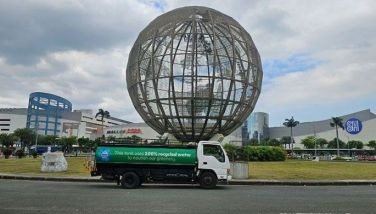Neri backs lower tariff on petrochem products

October 16, 2005 | 12:00am
Budget Secretary Romulo Neri said he does not see any need to review the decision made by the Cabinet-level Tariff and Related Matters (CTRM) committee to lower tariffs on 11 petrochemical products despite a request by the Association of Petrochemical Manufacturers of the Philippines (APMP) and JG Summit Petrochemical Corp. to keep the tariff cover.
Neri, a member of the CTRM, said he stands by the earlier decision to lower the current tariff of 10 percent to seven percent until JGSPC’s proposed naphtha cracker plant becomes operational.
Neri, the former head of the National Economic and Development Authority (NEDA), stressed that there is no need for a review of the CTRM decision even though a request has been made.
"A request has been made, but we haven’t met. There is no need to. We should go ahead with the lowering until the project is operational," Neri told reporters following a meeting of the National Development Co. (NDC) board at the Board of Investments (BOI) late Friday.
APMP and JGSPC have requested Trade and Industry Secretary Peter B. Favila and Finance Secretay Margarito Teves to review the CTRM decision since these officials were not part of the CTRM when the decision was made. An Executive Order on the tariff cut has been put on hold supposedly until the review is made.
However, aside from Neri, Tariff Commissioner Eduardo Abon and Trade Undersecretary Thomas Aquino are reportedly also standing by the CTRM decision.
The TRM technical staff reiterated that the process of reviewing the petrochemical tariff issue was thorough and valid.
APMP and JGSPC recently warned that removing the tariff cover would harm the midstream petrochemical manufacturers and possibly endanger the P26-billion naphtha cracker project which is still in the planning stage.
The naphtha cracker project was hatched in the late 1990s but has not yet materialized. In the meantime, the downstream plastics industry has had to bear with a tariff differential that supposedly "protected" their raw material resins but allowed the entry of finished plastic products.
The Philippines Plastics Industry Association (PPIA) claims that the government will be able to collect some P1.1 billion in revenues from the downstream petrochemical industries if government finally goes ahead with the reduction of tariff on 11 petrochemical products, the raw materials of the plastics industry.
Based on the PPIA’s computation, the government could collect P1.143 billion from the downstream petrochemical industries.
On the other hand, the government’s estimated loss from the reduction of the current 10-percent tariff on the 11 petrochemical products to the mandated five percent under the ASEAN Common Effective Preferential Tariff (CEPT) scheme would only be around P300 million.
Thus, with an expected P1.1 billion in additional tax revenues, the PPIA argued government would still have a net gain of almost P800 million.
Government, likewise, would be able to save the $3 million compensation that it must pay to Singapore for continuing to exclude the 11 petrochemical products from the mandated zero to five-percent average tariff rates under the ASEAN-CEPT scheme.
Plastic polymers are a by-product of crude oil refining, with the naphtha cracker producing the resins needed as raw materials for plastic manufacturing.
With the lack of raw materials, the PPIA said the plastics manufacturers have stopped production.
Unable to meet the continued demand for plastic products, the PPIA said the door was opened for imported plastic products to meet domestic demand, thus aggravating the problem of the local plastic manufacturing industry.
Thus, from the 2003 imports of finished plastic products of only 46,073 metric tons (MT), importations of finished plastic products in 2004 jumped by a whopping 85 percent to 85,242 MT.
The PPIA warns that if government fails to help the local downstream plastics industry by reducing the tariff on their raw materials, they would go under or simply turn into traders, resulting in massive job losses to plastic industry workers.
The tariff wall on the 11 petrochemical products is being maintained to protect one or two midstream petrochemical players who have not made good on their promise to supply the downstream industry with the necessary resins, the PPIA said.
Neri, a member of the CTRM, said he stands by the earlier decision to lower the current tariff of 10 percent to seven percent until JGSPC’s proposed naphtha cracker plant becomes operational.
Neri, the former head of the National Economic and Development Authority (NEDA), stressed that there is no need for a review of the CTRM decision even though a request has been made.
"A request has been made, but we haven’t met. There is no need to. We should go ahead with the lowering until the project is operational," Neri told reporters following a meeting of the National Development Co. (NDC) board at the Board of Investments (BOI) late Friday.
APMP and JGSPC have requested Trade and Industry Secretary Peter B. Favila and Finance Secretay Margarito Teves to review the CTRM decision since these officials were not part of the CTRM when the decision was made. An Executive Order on the tariff cut has been put on hold supposedly until the review is made.
However, aside from Neri, Tariff Commissioner Eduardo Abon and Trade Undersecretary Thomas Aquino are reportedly also standing by the CTRM decision.
The TRM technical staff reiterated that the process of reviewing the petrochemical tariff issue was thorough and valid.
APMP and JGSPC recently warned that removing the tariff cover would harm the midstream petrochemical manufacturers and possibly endanger the P26-billion naphtha cracker project which is still in the planning stage.
The naphtha cracker project was hatched in the late 1990s but has not yet materialized. In the meantime, the downstream plastics industry has had to bear with a tariff differential that supposedly "protected" their raw material resins but allowed the entry of finished plastic products.
The Philippines Plastics Industry Association (PPIA) claims that the government will be able to collect some P1.1 billion in revenues from the downstream petrochemical industries if government finally goes ahead with the reduction of tariff on 11 petrochemical products, the raw materials of the plastics industry.
Based on the PPIA’s computation, the government could collect P1.143 billion from the downstream petrochemical industries.
On the other hand, the government’s estimated loss from the reduction of the current 10-percent tariff on the 11 petrochemical products to the mandated five percent under the ASEAN Common Effective Preferential Tariff (CEPT) scheme would only be around P300 million.
Thus, with an expected P1.1 billion in additional tax revenues, the PPIA argued government would still have a net gain of almost P800 million.
Government, likewise, would be able to save the $3 million compensation that it must pay to Singapore for continuing to exclude the 11 petrochemical products from the mandated zero to five-percent average tariff rates under the ASEAN-CEPT scheme.
Plastic polymers are a by-product of crude oil refining, with the naphtha cracker producing the resins needed as raw materials for plastic manufacturing.
With the lack of raw materials, the PPIA said the plastics manufacturers have stopped production.
Unable to meet the continued demand for plastic products, the PPIA said the door was opened for imported plastic products to meet domestic demand, thus aggravating the problem of the local plastic manufacturing industry.
Thus, from the 2003 imports of finished plastic products of only 46,073 metric tons (MT), importations of finished plastic products in 2004 jumped by a whopping 85 percent to 85,242 MT.
The PPIA warns that if government fails to help the local downstream plastics industry by reducing the tariff on their raw materials, they would go under or simply turn into traders, resulting in massive job losses to plastic industry workers.
The tariff wall on the 11 petrochemical products is being maintained to protect one or two midstream petrochemical players who have not made good on their promise to supply the downstream industry with the necessary resins, the PPIA said.
BrandSpace Articles
<
>
- Latest
- Trending
Trending
Latest
Trending
Latest
Recommended


























